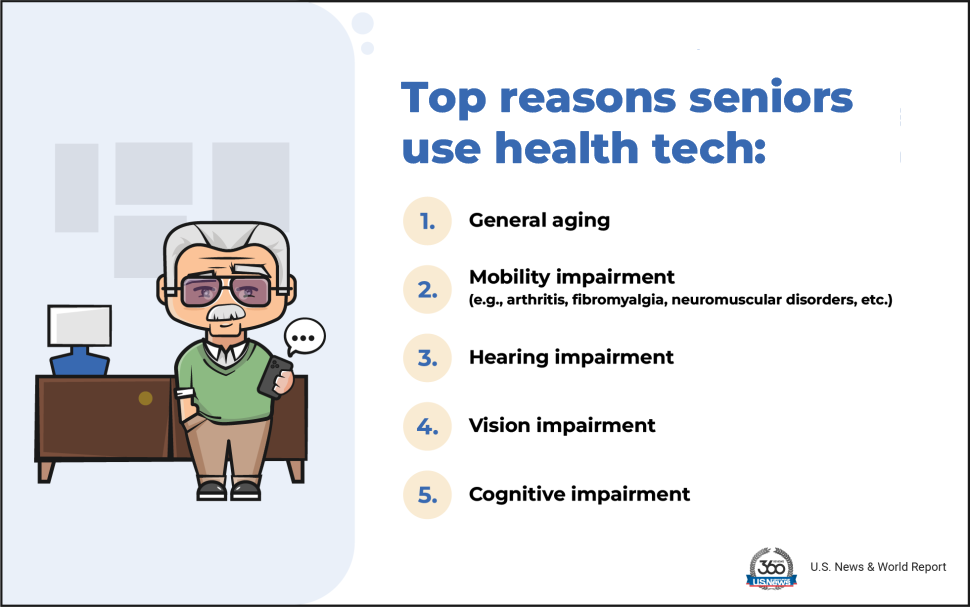
What You Should Know:
– A new survey conducted in June 2025 by U.S. News & World Report reveals that a vast majority of older adults (94%) desire to age in place, or grow old in their current homes and communities. As the U.S. population aged 65 and older is projected to increase significantly from 58 million in 2022 to 82 million in 2050, the role of assistive technologies in supporting this goal is becoming increasingly vital.
– The survey, which polled 1,000 U.S. adults aged 60 to 92, follows previous iterations in 2023 and 2024, providing insights into evolving opinions and consistent trends in technology adoption among seniors. The heightened draw toward aging in place is further fueled by limiting capacities and rising costs in nursing homes and assisted living facilities, with 57% of nursing homes reporting waiting lists in 2024.
Assistive Technology as a Cornerstone for General Aging Support
Assistive technologies, ranging from mobile apps to smart home features and medical alert devices, are increasingly being adopted by older adults. In 2023, nearly half (49%) of older adults reported using these technologies primarily to assist with general aging, while other reasons included mobility impairments (28%) and hearing impairments (22%).
The use of social technology is also widespread, with 84% of adults aged 65 to 92 using cell phones for texting and 65% for calls. More than half (66%) use Facebook to stay connected.
Considerations: Ease of Use and Setup
When considering assistive and health-related technologies, older adults prioritize accessibility and design. In a 2023 survey, over half (53%) of U.S. adults aged 55 and older used some form of assistive or health-related technology. Medical or health-related mobile apps (25%) and wearable trackers (17%) were among the most widely utilized.
The most important considerations among respondents were ease of use (75%) and ease of set up (50%). Other top factors included accessibility via a mobile app (38%) and wireless functionality (37%).
Improving Quality of Life, Safety, and Independence
More than half (57%) of older adults report that using assistive or health-related technologies has improved their quality of life. These technologies, such as health mobile apps, health trackers, and medical alert devices, not only encourage increased activity levels through features like motivational step tracking but also provide real-time vital monitoring and prompt emergency intervention, offering significant peace of mind.
Safety is a growing benefit: nearly half (49%) of surveyed seniors in 2025 report feeling safer when using assistive technologies, an increase from 47% in 2024 and 44% in 2023.
Furthermore, nearly half (45%) of all users of health-related assistive technologies report feeling more independent as a result. Such devices empower individuals to better understand their health by monitoring current conditions and detecting new issues earlier. Examples include smartwatches alerting users to potential health concerns like atrial fibrillation or irregular heart rates leading to early diagnosis of serious conditions.
Assistive technologies, like mobile medical alert devices, also incorporate GPS tracking and location pinpointing, allowing wearers to venture outside the home without fear of getting lost or being unable to call for help in an emergency. In 2025, one in four seniors stated that assistive technologies help them feel more mobile. An on-person button and specific location data sent to emergency services ensure timely response regardless of location.
Cost of Living and Home Preparedness Remain Key Hurdles
While aging in place is a highly desired goal, it remains unattainable for some due to financial constraints. Nearly half (49%) of all seniors cite cost-of-living increases as a major difficulty in their ability to age in place. This concern is underscored by the U.S. Census Bureau’s report that 36.8 million people lived in poverty in 2023, and the Bureau of Labor Statistics’ finding that the consumer price index rose at an annual rate of 2.4% in May 2025.
Preparedness is another significant factor, with 43% of seniors stating their home is minimally or not at all ready for aging in place. Modifications like home elevators, stair lifts, grab bars, or walk-in tubs can range from $3,000 to $15,000. Medicare, Medicaid, and some private health insurance policies may offer supplemental coverage for home mobility aids or medical alert devices to make aging in place more attainable.
Background/Methodology
The U.S. News & World Report team conducted three national surveys using Pollfish. The first two surveys (March 2023, April 2024) included adults 55 and older, while the June 2025 survey focused on those aged 60 to 92. Sample sizes were 2,000 (2023), 1,500 (2024), and 1,000 (2025). Responses were weighted to reflect the U.S. population by achieving equal distribution with known population characteristics.
